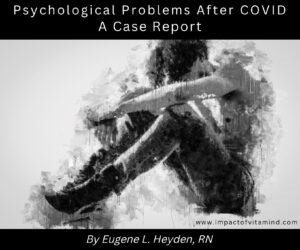By Eugene L. Heyden, RN
“Isolated reports of remission during bupropion treatment of TNF mediated illnesses, such as recurrent oral aphthous ulceration and Crohn’s disease have appeared and bupropions use has been suggested in these and some cancers, such as multiple myeloma and chronic lymphocytic leukemia, where TNF is believed to play prominent pathogenic roles.” ~Foley et al., 2006
Bupropion, also known as Wellbutrin, is a drug typically prescribed for depression, and has a nifty little trick up its sleeve, making it suitable for other applications. It can increase intracellular levels of a protein called cAMP, leading to decreases in the production of TNF-α (Kast and Altschuler, 2001). Notably, TNF-α is one of the principal cytokines that coordinate and drive the inflammation we see in IBD, so interfering with its production may allow remission to occur. There is a precedent for targeting TNF-α in the battle against Crohn’s and ulcerative colitis. Move over Remicade, bupropion is ready to serve.
Case report: Thomas
It sounds as though Thomas has been through the mill. At age 45, his twenty-year history of Crohn’s included 4 resections of his small bowel. And recently, although on azathioprine (Imuran), Thomas experienced another disease flare which led to yet another bowel resection. When the dust settled, his CDAI was calculated at approximately 275, which would place his disease activity in the moderately active range.
Somewhere along the line, Thomas was placed on fluroxetine (Prozac) for pain control, but this turned out to be ineffective. He was then placed on bupropion (Wellbutrin), which made him feel better, and which was continued by his primary physician. Although the report did not specify the length of time involved, my guess is that within weeks to months Thomas achieved remission.
“Currently, the patient is taking bupropion 150 mg three times daily. His Crohn’s symptoms have alleviated completely, and his CDAI is about 45 as a result of 3–4 diarrheas a day, possibly secondary to no longer having an ileal-cecal valve. He has had no CD flares or associated surgeries since starting bupropion. Under his doctor’s supervision, he has recently tapered his azathioprine from 100 to 50 mg every day without any increase in CDAI.” (Kast and Altschuler, 2001, emphasis added)
Related posts (Click image to open)
References:
Foley KF, DeSanty KP, Kast RE. Bupropion: pharmacology and therapeutic applications. Expert review of neurotherapeutics. 2006 Sep 1;6(9):1249-65. https://www.tandfonline.com/doi/abs/10.1586/14737175.6.9.1249
Kast RE, Altschuler EL. Remission of Crohn’s disease on bupropion. Gastroenterology. 2001 Nov 1;121(5):1260-1. https://www.sciencedirect.com/science/article/pii/S0016508501700212
DISCLAIMER: This article is offered solely for informational purposes. The information contained therein and opinions expressed should be evaluated for accuracy and validity in the context of opposing data, new information, and the views and recommendations of a qualified health care professional, and not to be substituted for professional judgment and guidance or to provide a reason to neglect or delay appropriate medical care for self or for others. It is the reader and reader only who bears the responsibility for any actions that could be construed as being a response to the information presented. The statements and opinions expressed by the author have not been reviewed or approved by the FDA or by any other authoritative body, nor is the author endorsing any product or specific therapy mentioned. This article and the opinions contained therein are offered to the reader to broaden his or her understanding of the issues discussed and to help identify options that may be suitable for the individual to pursue, on behalf of self or others, under approval and direction of a qualified physician or medical team member. All questions of a medical nature which arise from reading this article should be directed at qualified health care professional. There are no guarantees that a suggested website and internal links are safe to visit or open or are currently available.
Copyright © 2022 Eugene L. Heyden, RN
All Rights Reserved

DISCLAIMER: The book excerpts and articles featured on this website are offered solely for informational purposes. The information contained therein should be evaluated for accuracy and validity in the context of opposing data, new information, and the views and recommendations of a qualified health care professional, and not to be substituted for professional judgment and guidance or to provide a reason to neglect or delay appropriate medical care for self or for others. It is the reader and reader only who bears the responsibility for any actions that could be construed as being a response to the information presented. The statements and opinions expressed by the author or authors of the information provided on this website have not been reviewed or approved by the FDA or by any other authoritative body, nor is the author endorsing any product or specific therapy mentioned. The book excerpts, articles, statements, and opinions are offered to the reader to broaden his or her understanding of the issues discussed and to help identify options that may be suitable for the individual to pursue, on behalf of self or others, under approval and direction of a qualified physician or medical team member. All questions of a medical nature which arise from the book excerpts and articles available on this website should be directed at qualified health care professional.












